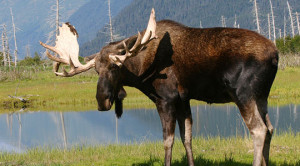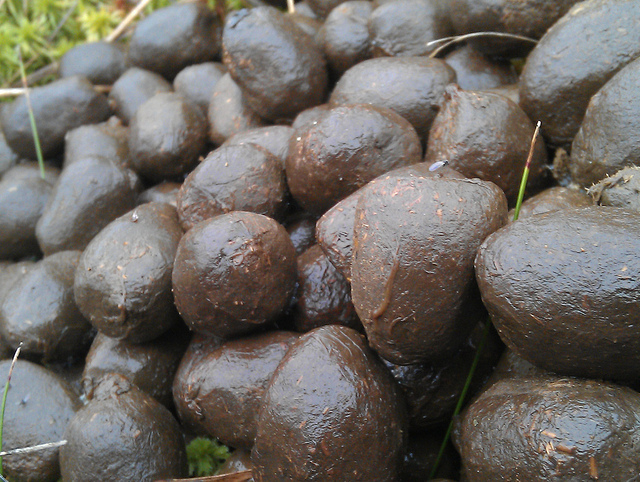A woman in Alaska who ate a medium-rare moose steak at week 26 of her pregnancy gave birth prematurely at 34 weeks because of a toxoplasmosis infection.
According to the Anchorage Daily News, Lauren Hamm’s 34-week  prenatal checkup was only supposed to be 10 minutes.
prenatal checkup was only supposed to be 10 minutes.
But she left the hospital 96 hours later. Her son, born prematurely, didn’t leave the neonatal intensive care unit for another three weeks.
Doctors said the meat was infected with Toxoplasma gondii, a parasite that can be found in under-cooked game meat. It causes toxoplasmosis, an infection that brings mild flu-like symptoms, like swollen glands, in adults but can be deadly to an unborn child. Hamm’s story was published in the September issue of Alaska Medicine.
Doctors said Hamm had the infection and passed it on to her unborn baby, Bennett. He was born on Dec. 13, 2011, with a heart rate of 200 beats per minute, Hamm said. He had fluid around his organs and lesions on his eyes and brain. Hamm said 45 minutes after Bennett was born, his heart rate was still irregular. Doctors used a defibrillator and shocked his heart back into rhythm.
“I had a prayer in my heart that everything was going to be OK,” she said.
Her doctor, Nelson Isada, a perinatologist at Providence Alaska Medical Center, was the senior author of the article.
Hamm said Isada wondered why Bennett’s heart rate was so irregular, and he ran as many blood tests as he could on her newborn son.  According to the article, after Isada found the lesions on Bennett’s eyes, he started to piece together that the baby might have toxoplasmosis.
According to the article, after Isada found the lesions on Bennett’s eyes, he started to piece together that the baby might have toxoplasmosis.
Isada later tested the moose meat from the family’s freezer and found that it tested positive for Toxoplasma gondii.
According to the article, humans can get Toxoplasma gondii in three ways: by eating under-cooked meat that contains the cysts where the parasite lives, by a mother during gestation, or ingesting the cysts while they are opening in foods, soil, water or a cat’s litter box.
He said women who are pregnant can eat moose meat but they should make sure the meat is cooked all the way through. They should also cook beef, lamb and veal roasts or steaks to 145 degrees and pork, ground meat and wild game to 160 degrees.
Hamm said her husband shot the moose on Joint Base Elmendorf-Richardson, and the family ate the steaks medium-rare, like they always do. She was 26 weeks pregnant.
She said she never considered it unsafe to eat moose meat, because it was organic.
Now, at 22 months old, baby Bennett’s lesions have healed and he is healthy.
 Last year officials from the Abitibi-Témiscamingue health agency and Quebec’s wildlife department collected samples from the kidneys of 24 moose that were hunted in the region.
Last year officials from the Abitibi-Témiscamingue health agency and Quebec’s wildlife department collected samples from the kidneys of 24 moose that were hunted in the region.




 in the Cochrane district.
in the Cochrane district. A moose head, hanging on a wall, probably lacks the water activity to support E.c oli sustinence or growth.
A moose head, hanging on a wall, probably lacks the water activity to support E.c oli sustinence or growth. So says Dave Barker, who works for the Knights of Columbus in Grand Falls-Windsor, Newfoundland.
So says Dave Barker, who works for the Knights of Columbus in Grand Falls-Windsor, Newfoundland. "It depends on how much moose is actually destroyed in the accident, but normally you get at least two moose burger sales out of one moose, so you’re looking at anywhere from $2,500 to $3,000," said Shane Budgell, president of the Lions Club in Grand Falls-Windsor.
"It depends on how much moose is actually destroyed in the accident, but normally you get at least two moose burger sales out of one moose, so you’re looking at anywhere from $2,500 to $3,000," said Shane Budgell, president of the Lions Club in Grand Falls-Windsor.